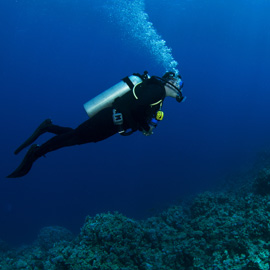Diving Deeper
Posted: Oct 26 in Dive Blog tagged Deep Diving, Specialty Diving by Jan
A guide to preparing yourself for the challenges of deep diving
If you’ve taken a dive class or recently received your scuba certification, you probably share one dream with your fellow aquatic enthusiasts: to plunge the depths of the ocean, exploring the last frontier on planet Earth. Though shallow dives and freshwater environments may whet your appetite, you may find your curiosity quickly piqued by the mysteries hidden near the ocean floor, especially as you become a more experienced diver.
If you’re hoping to explore some wrecks, come face to face with unique ocean life and make the most of your scuba skills, deep diving is the way to do it. Unfortunately, those added rewards come with added risks. Diving deeper than 60 feet increases your chances of depleting your air supply and experiencing nitrogen narcosis, but these dangers can be overcome with proper training and preparation.
To fully equip yourself for the challenges of deep diving, the most sensible choice is to take a dive class.
Get experienced.
You don’t want to go too deep too fast—it’s generally recommended for beginning divers to avoid dipping below 60 feet until gaining the experience and additional knowledge of an advanced course. Practicing deep diving skills on shallower dives is helpful as the consequences of mistakes are less severe.
Gear up.
Good equipment is important on any dive, but becomes even more important as you go deeper. You’ll want to make sure that you and your dive buddy are completely comfortable with every piece of equipment you bring along to avoid uncertainty in the water—be sure that you’ve used all of your gear on previous dives.
Depending on the depth and environment of your dive, a dive light may be crucial (bring a back-up too), while you may also want to hang a spare tank at around 15 feet in case you need emergency air. If you don’t already have a dive computer, it may be a good idea to get one, as the valuable information it provides will help you keep your dive within limits.
Stay alert and know your limits.
Because the added depth will deplete your air supply much faster, you’ll want to keep a wary eye on your depth and air gauges. You should also remember that deep diving can be strenuous—you’ll need to be rested, hydrated and well-prepared with a detailed plan.
In addition to keeping a watchful eye on each other, you and your dive buddy should look out for signs of nitrogen narcosis, as increased depth can exacerbate the narcotic effect of breathing nitrogen under pressure. If you start to feel euphoric, paranoid or an unreasonable sense of security, it may be a sign that the depth and nitrogen have begun to affect your mental state. Everyone experiences some degree of nitrogen narcosis at 100 feet or more, but staying focused, well-rested and alert can help you minimize its dangers.
Deep diving can be thrilling, but it can also be a challenge. Don’t go without properly preparing yourself—if you have any doubts, join us for a deep dive class and get ready to explore the wonders of the ocean’s depths!
